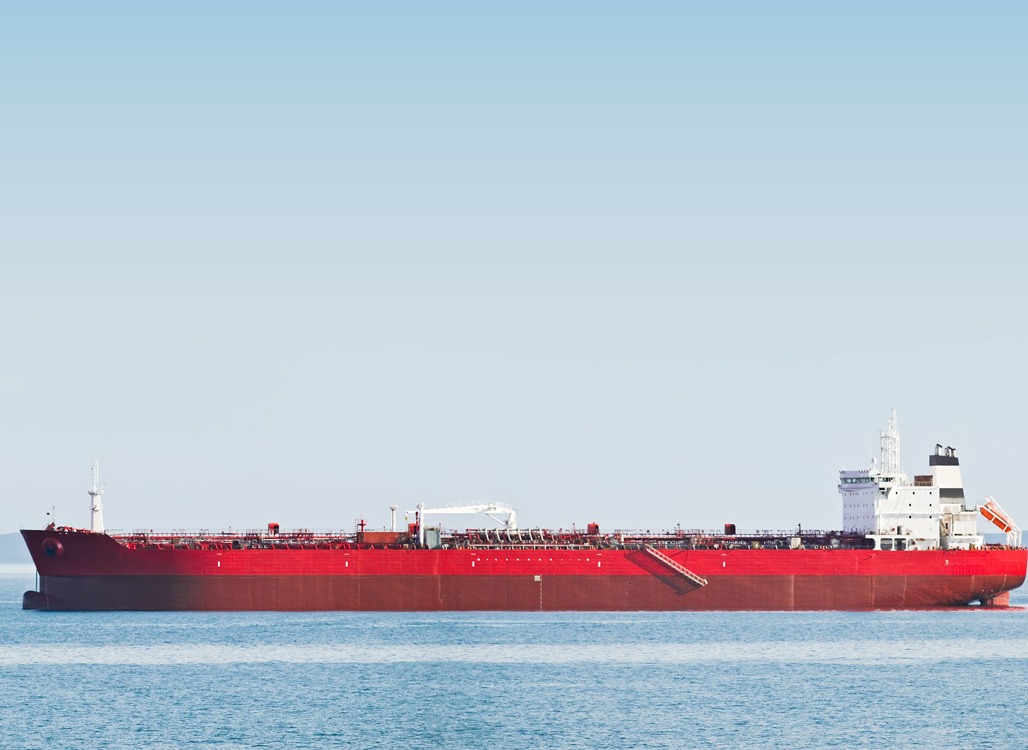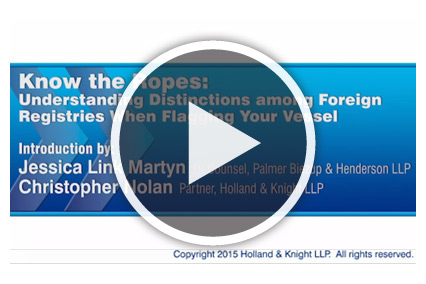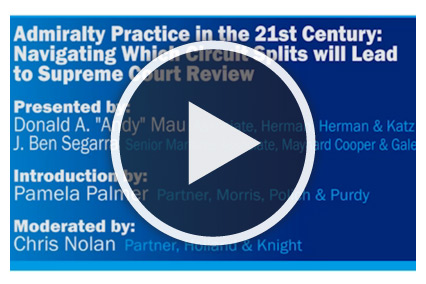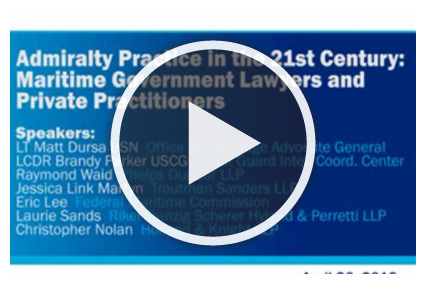Maritime Appellate and Amicus
- Appellate attorneys in Holland & Knight’s Maritime Law Practice have extensive experience preparing amicus briefs on behalf of maritime clients.
- Our maritime attorneys have obtained precedent-setting decisions in numerous cases before appellate courts.
- Our appellate strategy has succeeded in bringing a multitude of cases before the U.S. Supreme Court.

Overview
Whether your issue involves a maritime arbitration, collision litigation, Rule C lien dispute, bankruptcy ruling or Rule B security battle, Holland & Knight's maritime attorneys are experienced in the nuances of appellate law and procedure. Our team has appeared in appellate courts throughout the country, often engaged as counsel when another party has failed to obtain the desired outcome in the trial court.
Amicus briefs are an important tool to educate appellate courts on the unique maritime law aspects of a case, and they illustrate the effect a decision may have on the maritime industry, both domestically and internationally. Our team works with clients to develop a perspective that is both helpful to the court and representative of our clients’ goals. We prepare amicus briefs in cases before the U.S. Supreme Court, at both the merits and certiorari stage, as well as in circuit courts of appeal.
Resolutions for Clients and Courts
Our amicus clients have ranged from Protection & Indemnity (P&I) Clubs to shipowners associations to sovereign nations. For instance, in Stolt-Nielsen v. Animalfeeds International Corp., a case addressing class arbitrations that was widely seen as a seminal case for arbitration generally, our clients filed an amicus brief that informed the Supreme Court of the time-honored tradition of resolving charter party disputes in a bi-lateral arbitration with a panel of experienced maritime arbitrators.
In another significant case, our clients’ amicus brief in the Supreme Court case Exxon Shipping Company v. Grant Baker, et al. informed the court of the negative impact that unpredictable punitive damages would have on the maritime industry.
Representative Cases
Supreme Court Amicus Brief in Support of Petitioners Kawasaki Kisen Kaisha Ltd. and K-Line America, Inc. (in support of both the Petition for Writs of Certiorari and Petition) (July 20, 2009; Dec. 30, 2009)
Kawasaki Kisen Kaisha, Ltd. and K-Line America, Inc. v. Regal-Beloit Corp., et al.
- Brief of: International Group of Protection & Indemnity (P&I) Clubs, et al.
- Case Commentary: Mutual insurance depends on known and predictable liability regimes. The Carmack Amendment does not provide for consistent liability and, if applied to multimodal through bills of lading as it was by the Ninth Circuit, it will increase potential liability during international carriage. This increased liability will increase the cost of insurance, the cost of international trade to and from the United States and the cost and complexity of litigation of cargo claims. Furthermore, the Ninth Circuit's decision should be reversed because the Carmack Amendment does not apply to the carriage of goods between a non-adjacent foreign country and a destination in the United States.
- Resolution: On June 21, 2010, the Supreme Court held in favor of our clients' position by rejecting the application of the Carmack Amendment to the U.S. inland portion of through carriage from China to various locations in the United States, a ruling that will allow uniformity and predictability in the law governing multimodal carriage of goods.
Supreme Court Amicus Brief in Support of Petitioners Stolt-Nielsen S.A., et al. (Sept. 4, 2009)
Stolt-Nielsen, et al. v. Animalfeeds International Corp.
- Brief of: Association of Ship Brokers and Agents, BIMCO, Bergen Shipowners Association, Chamber of Shipping of America, International Association of Independent Tanker Owners, Japan Shipping Exchange, Inc., Norwegian Shipowners Association, Society of Maritime Arbitrators, Inc., Teekay Corporation
- Case Commentary: Maritime disputes arising out of charter parties are generally resolved by an arbitration panel of experienced maritime arbitrators in a bilateral, private and efficient proceeding. Class actions, which are not private, informal nor quickly resolved, are at odds with the customs and practices of maritime arbitral practice. It is therefore unreasonable to interpret silence in an arbitration provision as an indication that the parties involved intended to consent to class arbitration.
- Resolution: On April 27, 2010, the Supreme Court held in favor of our clients' position by ruling that, in the absence of express enabling language, arbitrators do not have the power to impose a class action arbitration on an objecting respondent.
Supreme Court Amicus Brief in Support of Petitioners Exxon Shipping Company, et al. (in support of both the Petition for Writs of Certiorari and Petition) (Sept. 20, 2007; Dec. 24, 2007)
Exxon Shipping Company v. Grant Baker, et al.
- Brief of: International Chamber of Shipping, the Baltic and International Maritime Council, Chamber of Shipping of America, Teekay Corporation, The Bahamas Shipowners Association (Petition for Writ)
- Brief of: International Chamber of Shipping, the Baltic and International Maritime Council, Chamber of Shipping of America, Teekay Corporation, The Bahamas Shipowners Association, American Institute of Marine Underwriters, American Commercial Lines, Inc. (Petition)
- Case Commentary: Permitting punitive damages in the context of this case would destroy the uniformity and predictability required by the domestic and international maritime industries. The oil spill in question was subject to the Clean Water Act (CWA), 33 U.S.C. § 1251, et. seq. and Exxon was punished in accordance with the CWA. The lower courts undermined uniformity by adding a punitive damage remedy to the remedies specified in the CWA. The CWA represents a careful balance by Congress between the interests of all parties involved in the transportation in question. That balance should not be upset by the addition of non-uniform and unpredictable punitive damages.
- Resolution: On June 25, 2008, the Supreme Court issued an opinion in favor of our clients' position, reducing a $5 billion punitive damage award to approximately $500 million. The ruling, limiting punitive damages in maritime cases, represents a victory in the long-standing efforts of the maritime community to promote the uniformity and predictability of maritime law.
Second Circuit Amicus Brief in Support of Petitioners Ocean World Lines, Inc. (Dec. 29, 2008)
Royal & Sun Alliance Insurance, PLC v. Ocean World Lines, Inc.
- Brief of: International Group of Protection & Indemnity (P&I) Clubs
- Case Commentary: Uniformity and predictability of maritime law are essential to the Amici P&I Clubs and world commerce. The application of one law, the Carriage of Goods by Sea Act, throughout the entire door-to-door multimodal carriage of goods is extremely beneficial to the Amici P&I Clubs and to their insured. The decision by the lower court to apply the same law to all the parties that participated in the carriage should be preserved because it promoted uniformity and predictability of law. Furthermore, the decision by the lower court should be affirmed because the Carmack Amendment does not have jurisdiction over carriage of goods between non-adjacent foreign countries and destinations in the United States.
- Resolution: The judgment of the District Court was affirmed on July 22, 2010.
Supreme Court Amicus Brief in Support of Petitioners Splendid Shipping Sendirian Berhad and M/V Harmony Container, In Rem (Oct. 27, 2008)
Splendid Shipping Sendirian Berhad and M/V Harmony Container, In Rem v. Trans-Tec Asia
- Brief of: Malaysia
- Case Commentary: Malaysian maritime law would not have allowed a third party to impose a lien against a ship for the supply of bunkers or other "necessaries" for the ship. The extraterritorial imposition of U.S. lien law in this case against a Malaysian shipowner's vessel for bunkers supplied by a Singapore company to a Taiwanese charterer of the ship in Korea will have serious repercussions in Malaysian foreign trade by sea. Malaysia needs a decision by the Supreme Court to unify the law within the United States and to advise Malaysia and other nations if U.S. courts will apply U.S. lien law extraterritorially.
- Resolution: The Supreme Court denied certiorari on December 1, 2008.



